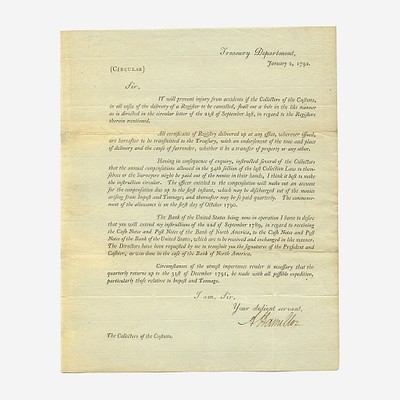[Hamilton, Alexander] [Public Credit] Report of the Secretary of the Treasury to the House of Representatives, Relative to a Provision for the Support
About Seller
2400 Market St
Philadelphia, PA 19147
United States
Established in 1805, Freeman’s Auction House holds tradition close, with a progressive mind-set towards marketing and promotion, along with access to a team of top experts in the auction business. And now with offices in New England, the Southeast, and on the West Coast, it has never been easier to ...Read more
Two ways to bid:
- Leave a max absentee bid and the platform will bid on your behalf up to your maximum bid during the live auction.
- Bid live during the auction and your bids will be submitted real-time to the auctioneer.
Bid Increments
| Price | Bid Increment |
|---|---|
| $0 | $25 |
| $500 | $50 |
| $1,000 | $100 |
| $2,000 | $200 |
| $3,000 | $250 |
| $5,000 | $500 |
| $10,000 | $1,000 |
| $20,000 | $2,000 |
| $30,000 | $2,500 |
| $50,000 | $5,000 |
| $100,000 | $10,000 |
About Auction
Oct 25, 2021
Freeman's is honored to present The Alexander Hamilton Collection of John E. Herzog, a single-owner sale of Alexander Hamilton material, on October 25. Curated by Darren Winston, Head of the Books and Manuscripts Department. Freeman's info@freemansauction.com
- Lot Description
[Hamilton, Alexander] [Public Credit] Report of the Secretary of the Treasury to the House of Representatives, Relative to a Provision for the Support of the Public Credit of the United States...the 14th Day of January, 1790
First edition of Alexander Hamilton's fundamental report that ushered in the financial revolution in the United States
"If the maintenance of public credit, then, be truly so important, the next enquiry which suggests itself is, by what means it is to be effected?�The ready answer to which question is, by good faith, by a punctual performance of contracts. States, like individuals, who observe their engagements, are respected and trusted: while the reverse is the fate of those, who pursue an opposite conduct...While the observance of that good faith, which is the basis of public credit, is recommended by the strongest inducements of political expediency, it is enforced by considerations of still greater authority...This reflection derives additional strength from the nature of the debt of the United States. It was the price of liberty."
New-York: Francis Childs and John Swaine, 1790. First edition. Folio, 13 1/4 x 8 1/2 in. (336 x 216mm). 51 pp. Gatherings stitched as issued, original thread sound; all edges untrimmed; title-page soiled and worn, 6 1/2 in. repaired closed tear to same; light dampstaining in margins and upper gutter; bottom of pp. 39/40 creased; scattered minor soiling to text; in red cloth slip case and chemise. Church 1253; Evans 22998; Ford, Bibliotheca Hamiltoniana 160
Rare first printing of the landmark document of American capitalism. Alexander Hamilton�s first major report as the first United States Secretary of the Treasury, outlining his visionary and controversial financial plans for the new nation. This document laid the groundwork for the establishment of the financial system of the United States, as he sought to restore the public credit of the country, and bind the states closer under the authority of the then new federal government. This document essentially constituted George Washington's legislative program during his first term and, conversely, planted the seeds for the creation of the political party system. Drawing on a variety of sources, including Hume, Montesquieu, Hobbes, and Postlethwayt, Hamilton's report sought to present, as Ron Chernow observes, a "broad political and economic vision" for the country, and sought to rescue the fledgling nation from its dire financial situation. By the time of this report's presentation to Congress, at the beginning of its second session on January 14, 1790, the country's finances were in a shambles. Following the Revolution, the federal government was essentially bankrupt, and it lacked the power to levy taxes and repay its financial obligations and debts, which by then were a staggering $79 million.
According to Hamilton biographer, Robert Hendrickson, Hamilton's plan, laid out in this report, "constituted a seven-point legislative program of President Washington's first administration. The seven points were: 1. the restoration of public credit, 2. a sound system of taxation, 3. a national bank, 4. a sound currency, 5. the promotion of commerce, 6. a liberal immigration policy, and 7. the encouragement of manufactures..."
Partisan lines quickly formed around those who were in support of Hamilton's agenda�the Federalists�and those who were against it�the so-called Jeffersonians or Democratic-Republicans�led by future presidents Thomas Jefferson and James Madison, of Virginia. Adverse to banking in general, and what they viewed as a system that resembled Great Britain in everything but name, Democratic-Republicans balked at Hamilton's ambitious agenda and warned of rampant speculation and the swindling of virtuous southern farmers by rich and corrupt northern bankers if passed into law. A centerpiece of Hamilton's plan was the assumption of state debts that remained from the Revolution under a single national debt that would be funded through a variety of new federal taxes, including an excise tax on whiskey, as well as tonnage duties and tariffs on imports. Democratic-Republicans opposed the idea because it would give too much power to the federal government, but after a compromise that saw the future site of the nation's capital placed in the South on the Potomac River, Hamilton's plan was adopted. The effects of the plan outlined here were vast: economic conditions greatly improved, interest rates declined, the money supply expanded, and the overall tax burden on the common people was greatly reduced.
- Shipping Info
-
No lot may be removed from Freeman’s premises until the buyer has paid in full the purchase price therefor including Buyer’s Premium or has satisfied such terms that Freeman’s, in its sole discretion, shall require. Subject to the foregoing, all Property shall be paid for and removed by the buyer at his/ her expense within ten (10) days of sale and, if not so removed, may be sold by Freeman’s, or sent by Freeman’s to a third-party storage facility, at the sole risk and charge of the buyer(s), and Freeman’s may prohibit the buyer from participating, directly or indirectly, as a bidder or buyer in any future sale or sales. In addition to other remedies available to Freeman’s by law, Freeman’s reserves the right to impose a late charge of 1.5% per month of the total purchase price on any balance remaining ten (10) days after the day of sale. If Property is not removed by the buyer within ten (10) days, a handling charge of 2% of the total purchase price per month from the tenth day after the sale until removal by the buyer shall be payable to Freeman’s by the buyer. Freeman’s will not be responsible for any loss, damage, theft, or otherwise responsible for any goods left in Freeman’s possession after ten (10) days. If the foregoing conditions or any applicable provisions of law are not complied with, in addition to other remedies available to Freeman’s and the Consignor (including without limitation the right to hold the buyer(s) liable for the bid price) Freeman’s, at its option, may either cancel the sale, retaining as liquidated damages all payments made by the buyer(s), or resell the property. In such event, the buyer(s) shall remain liable for any deficiency in the original purchase price and will also be responsible for all costs, including warehousing, the expense of the ultimate sale, and Freeman’s commission at its regular rates together with all related and incidental charges, including legal fees. Payment is a precondition to removal. Payment shall be by cash, certified check or similar bank draft, or any other method approved by Freeman’s. Checks will not be deemed to constitute payment until cleared. Any exceptions must be made upon Freeman’s written approval of credit prior to sale. In addition, a defaulting buyer will be deemed to have granted and assigned to Freeman’s, a continuing security interest of first priority in any property or money of, or owing to such buyer in Freeman’ possession, and Freeman’s may retain and apply such property or money as collateral security for the obligations due to Freeman’s. Freeman’s shall have all of the rights accorded a secured party under the Pennsylvania Uniform Commercial Code.
-
- Buyer's Premium



 EUR
EUR CAD
CAD AUD
AUD GBP
GBP MXN
MXN HKD
HKD CNY
CNY MYR
MYR SEK
SEK SGD
SGD CHF
CHF THB
THB![[Hamilton, Alexander] [Public Credit] Report of the Secretary of the Treasury to the House of Representatives, Relative to a Provision for the Support](https://s1.img.bidsquare.com/item/l/9470/9470928.jpeg?t=1MwoEQ)
![[Hamilton, Alexander] [Public Credit] Report of the Secretary of the Treasury to the House of Representatives, Relative to a Provision for the Support](https://s1.img.bidsquare.com/item/s/9470/9470928.jpeg?t=1MwoEQ)










